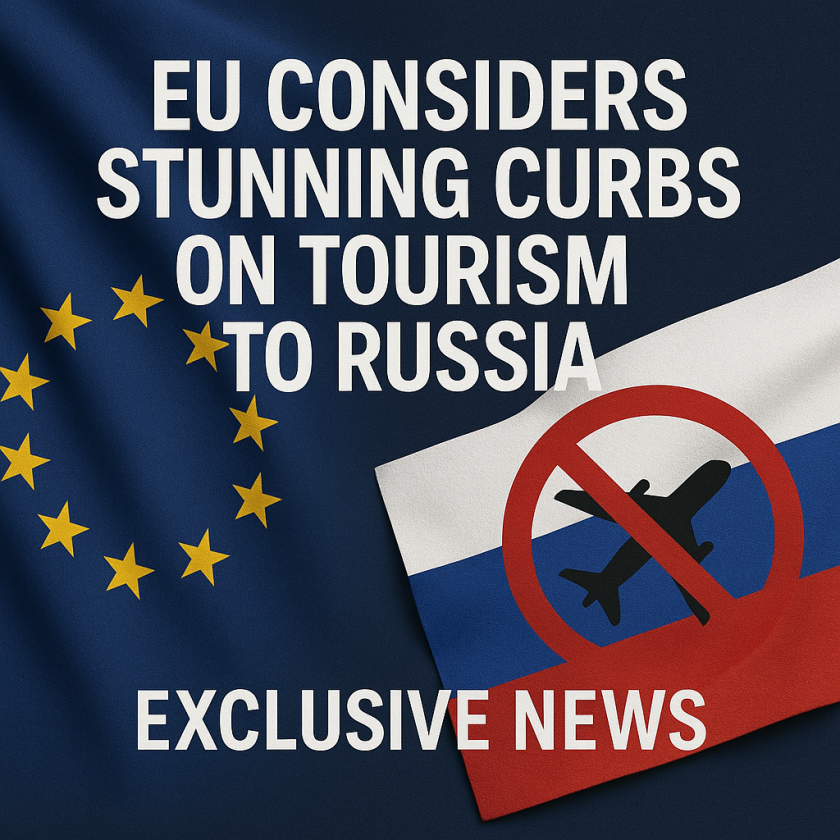EU Considers Stunning Curbs on Tourism to Russia – Exclusive News
EU Considers Stunning Curbs on Tourism to Russia
The EU’s consideration of travel restrictions to Russia raises critical questions about diplomacy, tourism, and the impact on both European and Russian economies. Amid growing geopolitical tensions, the EU is deliberating on imposing significant curbs on tourism to Russia, a move that could reshape the landscape of international travel and diplomatic relations for the foreseeable future.
Understanding the Context of Proposed Restrictions

The proposal for these travel restrictions comes against a backdrop of increasing unrest following Russia’s actions in Ukraine and other geopolitical maneuverings. EU leaders are evaluating options aimed at pressuring the Russian government while protecting the interests of their own citizens involved in travel or business within Russia.
According to reports from RT, the discussions point toward a potentially sweeping ban on leisure travel to Russia, which could include not only traditional tourists but also those visiting for business or cultural exchange. This would mark a significant escalation from previous sanctions that have mostly targeted economic sectors.
Perspectives from Different Stakeholders
Pros of Tourism Restrictions
Proponents of the restrictions argue that curbing tourism is a necessary step to exert diplomatic pressure on Moscow. They believe that reducing travel will send a clear signal that the EU disapproves of Russia’s actions. For instance, a senior EU diplomat mentioned that “there needs to be aligned actions from Europe,” asserting that tourism can be perceived as a form of tacit endorsement of the regimes in power.
Moreover, the economic fallout from such restrictions could further isolate Russia, specifically hitting sectors dependent on foreign tourists. A decline in tourism could pressure Putin’s government both financially and socially, fostering demonstrations or dissatisfaction among the Russian populace.
Cons of Cutting Off Tourism
Conversely, critics of the proposed measures highlight potential negative repercussions, suggesting that such curbs could unjustly punish ordinary Russians rather than the government. Some experts emphasize that isolating the Russian people might harden anti-Western sentiments and dismiss initiatives aimed at fostering understanding and dialogue. As noted in discussions from Al Jazeera, “cutting off cultural exchanges may backfire, closing pathways that could lead to understanding and peace.”
Furthermore, the tourism industry within the EU may face repercussions too. Countries like Finland, which share borders with Russia and rely on a steady flow of Russian tourists, could experience economic downturns if these curbs are enacted. Local businesses, particularly in hospitality and retail, could feel the immediate impact as they lose a vital customer base.
Weighing the Evidence
The debate on curbing tourism to Russia encapsulates a broader discussion about the balance between sanctions and diplomacy. Some argue that while restrictions might seem justifiable in the short term, they could hinder long-term goals of stability and dialogue. On the other hand, the argument for doing nothing comes with its own risks, including the message it sends regarding tolerance of aggressive actions.
As these discussions evolve, EU leaders face the tough task of balancing moral responsibility against practical implications. Do they risk alienating a population that could be a future ally simply to apply pressure on a regime resistant to change?
The Road Ahead: Exploring Options
As the EU evaluates the implications of tourism restrictions, several avenues may emerge from this complex situation:
1. Targeted Measures: Instead of a blanket ban, the EU could consider targeted measures that focus on luxury tourism or high-profile businessmen traveling to Russia. This could minimize the impact on everyday Russians while still sending a strong message to the Kremlin.
2. Cultural Exchanges: Promoting cultural exchanges and dialogues could serve as valuable alternatives to simply shutting down travel. Initiatives aimed at connecting artists, scholars, and regular citizens from both sides may foster understanding and empathy over apathy.
3. Monitoring and Accountability: Establishing mechanisms to monitor the effects of any implemented restrictions could provide data-driven insights that help adjust policies accordingly. This ensures that measures remain effective while also mitigating unintentional harm.
In conclusion, the EU’s discussions about imposing tourism curbs on Russia are multifaceted. With clear pros and cons emerging from various stakeholder perspectives, the ultimate decision may not be straightforward. The complexities of diplomacy, ethics, and economic implications will weigh heavily as EU leaders navigate this divisive issue. The challenge lies in balancing necessary pressure against potential backlash, all while keeping avenues for peace and understanding open for the future.




































